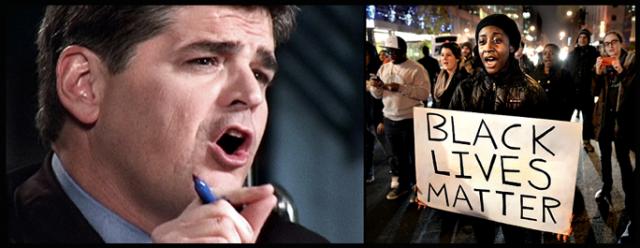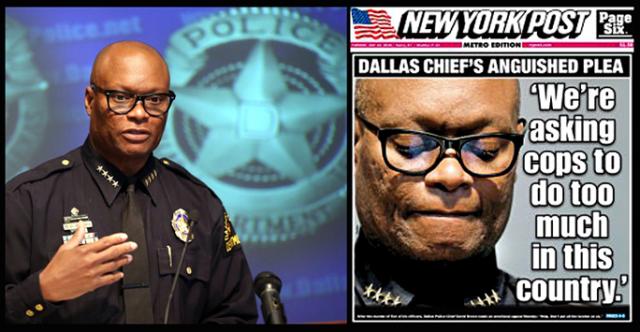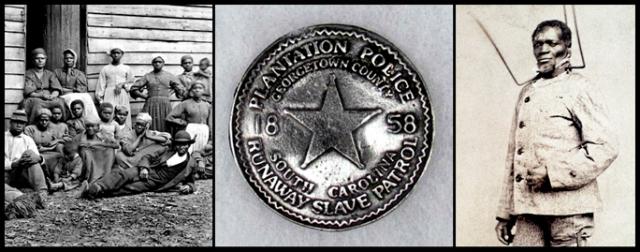Someone’s crying, Lord, kumbaya
– From the Gullah song meaning, Lord, come by here and help us
There was a true kumbaya moment after the Dallas cop massacre similar to the moment after 9/11 when sympathy was expressed for America from many unexpected quarters around the world. That window began to close when US leaders took a hard line and vengefully attacked an un-implicated nation to counter the very sense of vulnerability that moved people of the world to sympathize with us. Similarly, the sympathy for attacked cops in Dallas may be evaporating thanks to a familiar sociological dynamic involving in-group, out-group identification.
Sociologists and psychologists call this “the ultimate attribution error.” As explained in an interesting New York Times article by Amanda Taub, it’s when people “attribute another group’s positive actions to random chance or circumstance but assume that [the other group’s] negative actions reflect the group’s core nature.” That is, in times of stress, people “circle the wagons” around their own kind based on a belief that their motives are human and honorable; those of the projected enemy are the essence of pure evil. “Once you dehumanize them, it’s easier to justify violence,” says Professor John Dovidio of the Inter-Group Relations Lab at Yale.
This can be seen on both sides of the Black Lives Matter versus Blue Lives Matter conflict. For me, it involves anger, laziness and a failure of courage to see or listen to or talk with a perceived enemy. Better to huddle up with your own pack and project your fears on the other guy.
 Sean Hannity and a Black Lives Matter protester
Sean Hannity and a Black Lives Matter protester
As I bounced around cable news in the days following the Dallas cop massacre, no one was worse (maybe I should say “better”) at this than the odious Sean Hannity. (I confess, I’m biased: Sean Hannity is the root of all evil.) Hannity loves to point out his enemy’s shortcomings: that is, for them, examples of bad-cop behavior become an overarching metaphor for all-cops-are-bad and the System is totally based on white supremacy. Good point; that does happen. The trouble is, he then does the same thing ten times over; there’s not a dialogic bone in the man’s body.
Five days after the Dallas massacre, on July 11, he opened his show with: “The left’s war against law enforcement is now intensifying.” He proceeded to present a highly energized, demonizing tirade against Black Lives Matter that should be studied as a classic example of the ultimate attribution error. He exploited an out-of-context chant from people reportedly attending a Black Lives Matter demonstration a year or so ago. The chant was: “Pigs in a blanket; fry ‘em like bacon. What do we want? Dead cops. When do we want ‘em? Now!” There’s wide agreement whatever happened in this case wasn’t the Black Lives Matter movement’s finest moment; but it certainly did not characterize the greater movement, which is non-violent. Nonetheless, Hannity brandished the quote like a weapon, hacking and slashing, using it to interrupt and batter any of his guests who made even the slightest effort to defend or explain Black Lives Matter. Without a hint of embarrassment, he employed it over-and-over-and-over-and-over. (So many iterations are necessary to capture Hannity’s untempered bullying style.) Guests like Geraldo Rivera and Daryl Parks, an attorney for the Michael Brown family in Ferguson, were simply overwhelmed and gave up trying to explain how he was twisting the matter. These men would have had to bellow or punch him in the face to be heard. Hannity then closed that part of the show and moved on to nauseatingly stroke Rudy Guiliani, who further demonized Black Lives Matter as the worst thing that ever happened to African Americans. His mayoral term and his “broken windows/stop-and-frisk” police policy, of course, were literally the best things that ever happened to African American New Yorkers.
I imagine millions of retired white Americans in loungers eating this stuff up. If that’s all one watches or reads on the story, the ultimate attribution error rules. It was said of Ronald Reagan that, like Giuliani, his assurances that his policies were good for minorities and Black Americans was to assure white Americans they had no cause to be concerned: He had African Americans’ interests at heart. On top of such reassurances, the relentless attack on Black Lives Matters acts as a classic propaganda campaign to form in the minds of the audience a well-defined enemy. These are the bad guys, the cause of all our problems. It’s the identical dynamic that emphasizes “radical Islam” in the War On Terror context. It’s an example of branding the ultimate attribution error as a catchy, memorable phrase. RADICAL ISLAM. BLACK LIVES MATTER. Hear the words intoned over and over enough associated with pure evil and a true warlike mindset is established. Since their tool is language as obfuscation — versus language for clarity — their efforts spew out a fog of war, which further makes their “enemy” stand out starkly in the fog.
Any kind of serious kumbaya, peace-oriented moment is made impossible.
While Hannity may be the worst of the worst, the dynamic of using erroneous attribution of out-of-context facts or factoids to metaphorically represent the whole of something is epidemic in America’s cyber-crazy world. Few of us want to consider the messy, confusing roots of things tangled up in the soil of history. Complexity disturbs our comfort zones and involves change on the part of people unwilling to change. The bogus metaphoric roots created in the mind derived from the ultimate attribution error end up cutting off the tree from real historic nutrients. The tree can’t survive. It’s wood may be useful to make homes or other products, but the real roots are lost and absorbed in the soil. A fiction has taken hold.
Chief David Brown Adds Some Needed Clarity
For me, the most important observation made in the immediate aftermath of the Dallas massacre was by Dallas Police Chief David Brown, a man who has experienced terrible violence within his family. Here’s the full quote from the New York Times. This is a man who, under attack, didn’t revert to machismo; instead, he publicly admitted his police force was “vulnerable.” When he says the following, it’s not hard to imagine him frazzled and frustrated over the killing of five of his officers, the hunting down and killing of their killer by a militarized robot bomb and the inevitable assault by the media. He’s speaking about the mission of policing and why things are so screwed up:
 Dallas Police Chief David Brown
Dallas Police Chief David Brown
“Every societal failure, we put it off on the cops to solve. Not enough mental health funding, let the cop handle it. Not enough drug addiction funding, let’s give it to the cops. Here in Dallas we got a loose dog problem. Let’s have the cops chase loose dogs. Schools fail, give it to the cops. Seventy percent of the African American community is being raised by single women. Let’s give it to the cop to solve that as well. Policing was never meant to solve all these problems.”
Amen, brother! One could write long dissertations on any of these items and many others. For instance, on drugs. Have a historic, widely-based demand for intoxicants among your citizens? Make the stuff illegal and give the problem to the cops to solve by filling up more and more prisons; re-run the 1930s Prohibition debacle that spread corruption across the land. Press our cops to do more at every turn; tempt them with this and lure them with that into assuming a host of non-police problems. Have a problem raising taxes because nobody, especially the rich, likes to pay taxes? Hand the task over to the cops; send them out to harass the poor and working stiffs with traffic tickets and all sorts of citations for half-ass infractions. The US attorney general found Ferguson, Missouri, to be a cesspool of this explicitly racist, exploiting dynamic. Think about the following for a moment: Police shooting victim Philando Castile had 52 traffic citations for things like the broken taillight he was stopped for on July 6, the day he was shot dead reaching for his license. Fifty-two! It’s a brilliant idea: Build the police up as a heroic institution and societal power base and give them lots of money and more and more percs as you pile on the jobs that would otherwise cost taxpayer dollars. Make them so important to the racket that is modern society that you’re forced to go soft on accountability. Because of all the pressure you’ve put on them, naturally you have to let the poor bastards you’ve so overburdening get away with murder. Hey, the officer was scared as he walked up to the car window to extort the driver. The rookie officer who shot Philander Castile dead had just completed a course called “The Bulletproof Warrior” that shows attendees videos of cops being overwhelmed and blown away. Shoot first, ask questions later becomes a legal tactic.
One can lay much of this problem at the doorstep of the conservative mantra to lower taxes on anything smacking of a social program — anything not military or criminal justice oriented. This doesn’t just indict Republicans; the effort has been entirely bi-partisan, which is why it’s sustained. Thanks to the Drug War and things like no-court-order-necessary asset retrieval and the gift of surplus federal military equipment, police departments have been built up to be personal fiefdoms; in a nation of devastated working class unions beleaguered by a corporate hierarchy, the Fraternal Order of Police and other police unions continue to thrive.
Chief Brown is, of course, a complicated character and let’s not forget he’s the police chief of a major city in the ornery, quite conservative state of Texas. He seemed to retreat a bit on his frustrated litany when he said Black Lives Matter protesters should leave the protest line and become police officers. “Serve your communities. Don’t be a part of the problem. We’re hiring.” Here, he seemed to be suggesting Dallas PD could and should solve all the black community’s problems; all that was needed was more cops and fewer protesters. The fact is, there are many ways other than being a police officer to serve one’s community. Protest can serve the community.
If his earlier remarks were to be taken seriously, it logically meant fewer police were needed; in a reformed governing structure the social tasks he cited as dumped on cops would be taken up properly by non-police institutions. Cops would have a more limited mission focused on serious crime and violent-actor apprehension. They would not be tax-police like the cop who choked struggling citizen entrepreneur Eric Garner to death over unpaid taxes selling single cigarettes. Resources going to the police could be shifted to the social and medical context and to other venues. The fact is Chief Brown’s litany is a wonderful map for a more progressive future. I’d even suggest the Democratic Party incorporate the spirit of Chief Brown’s frustration-rooted litany into its 2016 Presidential Campaign Platform.
Transforming Chief Brown’s Concerns Into Policy
The kumbaya moment in which Chief Brown spoke is threatened by the fog of culture war and political dishonesty.
But, what the hell, imagine a nation with a well-thought-out and well-funded mental health program that does not stigmatize people but is meant to help them cope with our loopy society so they can feel part of that society as a productive citizen; imagine this program in synch with a sane gun policy that prevents mentally ill people from obtaining weapons. Imagine a nation that could figure out how to end the bi-partisan debacle preposterously called a War On Drugs, freeing our cops of a tremendous burden and lifting the temptations for corruption. Imagine clearing out huge numbers of inmates warehoused at tax-payer expense in our prisons; the money saved could be invested in making these ex-inmates’ lives productive. Dallas could fund a future-oriented dog-catcher program that focused on the capture and sterilization of feral dogs. As the chief suggests, to ease up on our cops we might improve our schools and our education system to better train youth for productive jobs that pay a salary that can support a family — so they don’t feel the psychological need to join gangs and have crazy turf wars. Imagine a pragmatic assault on the dynamics of poverty that respected economic life from the bottom up; the liberation theologists call it a preferential option for the poor — versus what we have now, which we might call a preferential option for the rich. Poverty not as a pathological shortcoming, but as reality to improve on. All this would over time shift the tasks Chief Brown listed as heavy burdens on cops; for example, it would certainly improve the single-mother/absent father issue he cited by emphasizing employment and the dignity of family life.
We did not arrive at Chief Brown’s dysfunctional scenario overnight, so correcting it cannot happen overnight. The conditions he spoke of were created by the sluffing off of social responsibility onto police forces. Former Seattle Police Chief Norm Stamper in his new book, To Protect and Serve: How To Fix America’s Police, runs down the history of police in America. It started in Colonial times with citizen “watchers” and office-holders modeled on English sheriffs. Sir Robert Peel famously created the first police department in London in 1829 called the Metropolitan Police Service. The first real police forces in America were in the south, formed to protect and serve the institution of slavery. Some like to sneer at this, but it’s true. Have a problem with unruly slaves and keeping them on the plantation? Give the job to the cops. Since “cops” didn’t exist then, they were created as a force to accomplish a need arising from the institutional enslavement of human beings for profit. How’s that for roots?
 Virginia slaves; Plantation Police badge; freed slave Wilson Chimm in punishment device, 1863
Virginia slaves; Plantation Police badge; freed slave Wilson Chimm in punishment device, 1863
Fixing this stuff comes down to politics. One of the greatest hurdles now is a pathologically dysfunctional Republican Party that sees its mission as obstruction and preventing any of this being done. Politicians like Joe Biden and Bill Clinton are culpable for much of what Chief Brown sketched out. In Biden’s case, he was an architect of the pro-police, anti-crime bill back in the 1980s that beefed up the cops while taxes and social programs were being cut under Reagan. Clinton pushed police bills and mass incarceration during his time in the White House. Still, the worst of it is at the door of a willfully obstructionist Republican Party.
The possibility exists that the Trump GOP will self-destruct and the House and Senate will go Democratic. This could help a President Hillary Clinton shift from the center-right to a more progressive reform posture. More terrorist attacks like the one in Nice will push the fulcrum to the fear-based right. In the meantime, war-cheerleaders like Sean Hannity will keep doing what they do and Black Lives Matter will continue to fight for dignity — in the streets if necessary.
